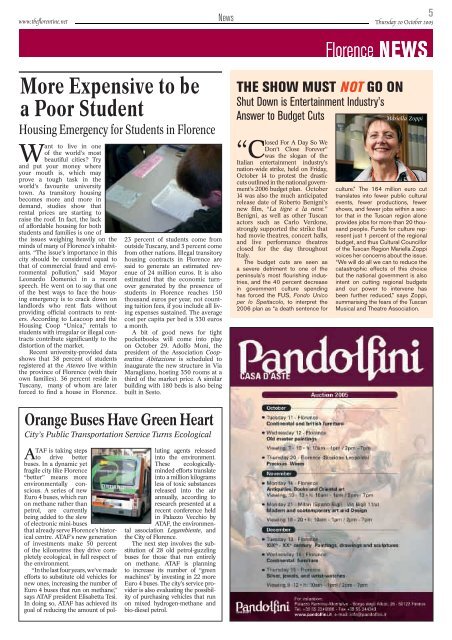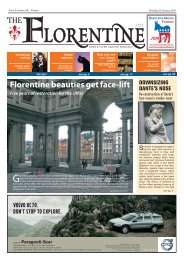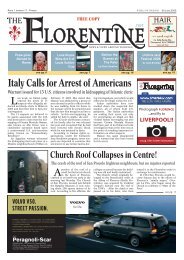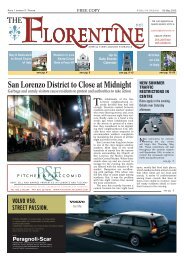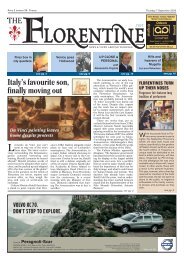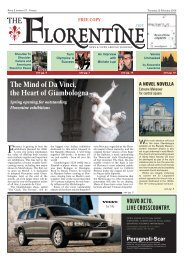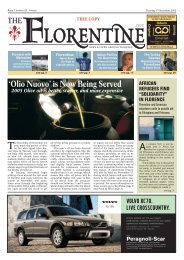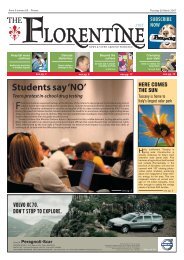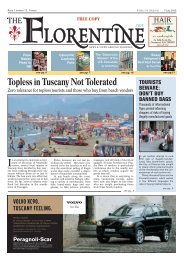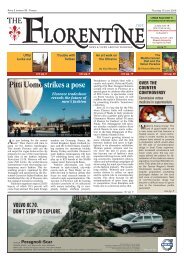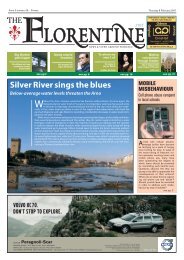Notorious Vandal Strikes Again - The Florentine
Notorious Vandal Strikes Again - The Florentine
Notorious Vandal Strikes Again - The Florentine
You also want an ePaper? Increase the reach of your titles
YUMPU automatically turns print PDFs into web optimized ePapers that Google loves.
www.theflorentine.net<br />
More Expensive to be<br />
a Poor Student<br />
Housing Emergency for Students in Florence<br />
Want to live in one<br />
of the world’s most<br />
beautiful cities? Try<br />
and put your money where<br />
your mouth is, which may<br />
prove a tough task in the<br />
world’s favourite university<br />
town. As transitory housing<br />
becomes more and more in<br />
demand, studies show that<br />
rental prices are starting to<br />
raise the roof. In fact, the lack<br />
of affordable housing for both<br />
students and families is one of<br />
the issues weighing heavily on the<br />
minds of many of Florence’s inhabitants.<br />
“<strong>The</strong> issue’s importance in this<br />
city should be considered equal to<br />
that of commercial fraud and environmental<br />
pollution,” said Mayor<br />
Leonardo Domenici in a recent<br />
speech. He went on to say that one<br />
of the best ways to face the housing<br />
emergency is to crack down on<br />
landlords who rent flats without<br />
providing official contracts to renters.<br />
According to Leacoop and the<br />
Housing Coop “Unica,” rentals to<br />
students with irregular or illegal contracts<br />
contribute significantly to the<br />
distortion of the market.<br />
Recent university-provided data<br />
shows that 38 percent of students<br />
registered at the Ateneo live within<br />
the province of Florence (with their<br />
own families). 36 percent reside in<br />
Tuscany, many of whom are later<br />
forced to find a house in Florence.<br />
23 percent of students come from<br />
outside Tuscany, and 3 percent come<br />
from other nations. Illegal transitory<br />
housing contracts in Florence are<br />
said to generate an estimated revenue<br />
of 24 million euros. It is also<br />
estimated that the economic turnover<br />
generated by the presence of<br />
students in Florence reaches 150<br />
thousand euros per year, not counting<br />
tuition fees, if you include all living<br />
expenses sustained. <strong>The</strong> average<br />
cost per capita per bed is 330 euros<br />
a month.<br />
A bit of good news for tight<br />
pocketbooks will come into play<br />
on October 29. Adolfo Moni, the<br />
president of the Association Cooperativa<br />
Abitazione is scheduled to<br />
inaugurate the new structure in Via<br />
Maragliano, hosting 350 rooms at a<br />
third of the market price. A similar<br />
building with 180 beds is also being<br />
built in Sesto.<br />
Orange Buses Have Green Heart<br />
City’s Public Transportation Service Turns Ecological<br />
ATAF is taking steps<br />
to drive better<br />
buses. In a dynamic yet<br />
fragile city like Florence<br />
“better” means more<br />
environmentally conscious.<br />
A series of new<br />
Euro 4 buses, which run<br />
on methane rather than<br />
petrol, are currently<br />
being added to the slew<br />
of electronic mini-buses<br />
that already serve Florence’s historical<br />
centre. ATAF’s new generation<br />
of investments make 50 percent<br />
of the kilometres they drive completely<br />
ecological, in full respect of<br />
the environment.<br />
“In the last four years, we’ve made<br />
efforts to substitute old vehicles for<br />
new ones, increasing the number of<br />
Euro 4 buses that run on methane,”<br />
says ATAF president Elisabetta Tesi.<br />
In doing so, ATAF has achieved its<br />
goal of reducing the amount of polluting<br />
agents released<br />
into the environment.<br />
<strong>The</strong>se ecologicallyminded<br />
efforts translate<br />
into a million kilograms<br />
less of toxic substances<br />
released into the air<br />
annually, according to<br />
research presented at a<br />
recent conference held<br />
in Palazzo Vecchio by<br />
ATAF, the environmental<br />
association Legambiente, and<br />
the City of Florence.<br />
<strong>The</strong> next step involves the substitution<br />
of 28 old petrol-guzzling<br />
buses for those that run entirely<br />
on methane. ATAF is planning<br />
to increase its number of “green<br />
machines” by investing in 22 more<br />
Euro 4 buses. <strong>The</strong> city’s service provider<br />
is also evaluating the possibility<br />
of purchasing vehicles that run<br />
on mixed hydrogen-methane and<br />
bio-diesel petrol.<br />
News<br />
5<br />
Thursday 20 October 2005<br />
Florence NEWS<br />
THE SHOW MUST NOT GO ON<br />
Shut Down is Entertainment Industry’s<br />
Answer to Budget Cuts<br />
For A Day So We<br />
Don’t Close Forever”<br />
“Closed<br />
was the slogan of the<br />
Italian entertainment industry’s<br />
nation-wide strike, held on Friday,<br />
October 14 to protest the drastic<br />
cuts outlined in the national government’s<br />
2006 budget plan. October<br />
14 was also the much anticipated<br />
release date of Roberto Benigni’s<br />
new film, “La tigre e la neve.”<br />
Benigni, as well as other Tuscan<br />
actors such as Carlo Verdone,<br />
strongly supported the strike that<br />
had movie theatres, concert halls,<br />
and live performance theatres<br />
closed for the day throughout<br />
Italy.<br />
<strong>The</strong> budget cuts are seen as<br />
a severe detriment to one of the<br />
peninsula’s most fl ourishing industries,<br />
and the 40 percent decrease<br />
in government culture spending<br />
has forced the FUS, Fondo Unico<br />
per lo Spettacolo, to interpret the<br />
2006 plan as “a death sentence for<br />
Mariella Zoppi<br />
Max Biaggi<br />
culture.” <strong>The</strong> 164 million euro cut<br />
translates into fewer public cultural<br />
events, fewer productions, fewer<br />
shows, and fewer jobs within a sector<br />
that in the Tuscan region alone<br />
provides jobs for more than 20 thousand<br />
people. Funds for culture represent<br />
just 1 percent of the regional<br />
budget, and thus Cultural Councillor<br />
of the Tuscan Region Mariella Zoppi<br />
voices her concerns about the issue.<br />
“We will do all we can to reduce the<br />
catastrophic effects of this choice<br />
but the national government is also<br />
intent on cutting regional budgets<br />
and our power to intervene has<br />
been further reduced,” says Zoppi,<br />
summarising the fears of the Tuscan<br />
Musical and <strong>The</strong>atre Association.


